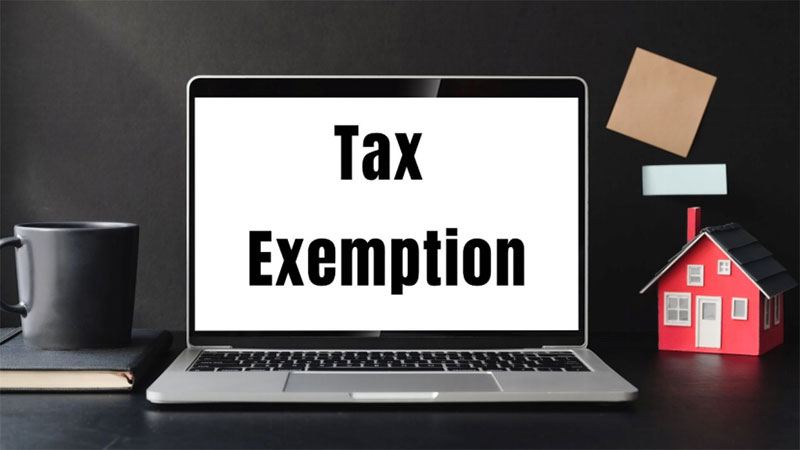The phrase "tax-exempt" describes revenue or financial activities not subject to any form of taxation at the national, regional, or city level. Tax-exempt goods can be reported for academic reasons on a taxpayer's personal or corporate tax return. This may be the case whether the taxpayer is an individual entity or an entire business. The computation of taxes does not include the item that is free from taxation.
"Tax-exempt" might also allude to the classification of a company or entity with restrictions placed on the limit of taxable revenue or contributions they receive. A few examples of these groups include congregations and nonprofits.
Tax Exemption: What Does It Mean?

A tax-exempt business, organization, or individual enjoys no federal, state, or municipal tax on its revenue or operations. Typically, nonprofits and religious organizations are the kinds of groups that the IRS recognizes as exempt from paying taxes. They do not have to pay taxes to the federal government (this means that they are granted tax-exempt classification. Hence, contributions made to them are often deducted from their taxable income.
Tax Exemption Example
There are generally three distinct implications associated with tax exemption.
Do you qualify for an exemption from the tax withheld?
In some cases, you can change the amount of federal income tax deducted from your payments by filling out a new Form W-4 with your employer. Your salary will still be reduced by the required amount for Social Security and Medicare.
In most cases, there are just two situations in which you won't have to pay any withholding tax:
Since you owed no federal revenue tax in 2016, you received a full refund of any taxes withheld. You anticipate the same result this year.
Have you received any revenue not subject to taxation?
However, according to the Internal Revenue Code, the tax liability is calculated as follows: gross income without deductions. According to current legislation, "gross revenue" includes "all revenue, regardless of source." Income generated from employment and other streams and underserved earnings derived from investments and other channels is covered.
Do you fall under the minimum wage and the overtime regulations exception?
The Fair Labor Relations Act mandates that employers pay their employees at least the minimum wage and any applicable overtime rates. On the other hand, those restrictions only apply to some who work in a position such as executive, managerial, expert, or outside marketing.
When determining whether or not a worker is exempted from the minimum pay and overtime regulations, the Department of Labor applies a few different standards. They are typically associated with monetary compensation and the tasks of the position. Visit the website of the department to acquire further knowledge.
Personal Tax Exemption: What is it?
The ability to avoid paying taxes on particular aspects of one's earnings or operations can be referred to as a tax exemption. By declaring personal exemptions, individuals can reduce their taxable income by as much as 4,050 USD for each qualified member from their taxable income for each qualifying family member. However, there are no longer any individual tax exemptions.
Differentiate Tax Exemptions Vs. Tax Deductions Vs. Tax Credits
- Exemptions from paying taxes reduce the amount of money that may initially be included as revenue; In other words, exemptions are often subtracted directly from the total.
- Generally speaking, tax deductions are expenditures you've made during the year that reduce the proportion of your earnings that is liable to taxation.
- Tax credits can reduce your overall tax liability by the same amount they are worth.
- Before the new tax laws implemented in 2018, you may claim a personal exemption for yourself and your partner, as well as a reliance exclusion for your offspring or other dependents.
Tax Exempt Earnings: What Are These?
Tax-exempt should not be mistaken for a tax deduction since the individual is not required to pay duties on the tax-free activity or earnings when the tax-exempt status is granted. On the other hand, taking advantage of tax deductions is to lessen one's taxable income, reducing their overall tax burden.
Interest paid on debt securities is a frequent kind of tax-exempt earnings. Local bonds are debt instruments issued by governments and towns to obtain revenue for overall operations or a specific goal. When taxpayers generate investment returns on debt instruments issued in their respective states, the benefit is free from state and federal taxes.
Avoidance of Capital Gains Taxes

A taxpayer can purchase a commodity and afterward profit from its sale. There will be taxation on the gain because it is a net profit. However, there are numerous exceptions to the taxation of capital gains.
Taxpayers can reduce their taxable capital gain by the amount of their yearly capital loss. If a trader earns 5,000 USD but loses 3,000 USD, only 2,000 USD of their capital gains will be subject to taxation. There is a yearly limit of $3,000 on the value of capital liabilities that taxpayers can deduct. Capital losses in surplus of the limit can be carried over and used to reduce gains in subsequent years.
Profits made on transferring a primary residence may qualify for an exclusion from federal income taxation under certain conditions outlined in the tax code.
Organization Eligible for Tax Exemption
Form 990-T needs to be submitted by any tax-exempt entity with a net income from a non-related company more significant than $1,000. If an institution anticipates that its total tax liability for the year will be $500 or even more, it must make quarterly tax payments.
The Internal Revenue Service (IRS) defines a 501(c)(3) charitable organization as a tax-exempt charity. Neither its profits nor the contributions it receives are subject to taxation by the government.
The amount of their contribution may decrease a donor's taxable income. This reward promotes private giving and facilitates fund-raising efforts for charitable organizations.







